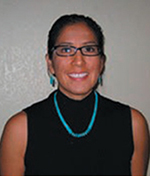 Why did you choose your specific health professional career?
Why did you choose your specific health professional career?
When I was a child I was riding my bike and my leg was bitten by a rez (reservation) dog. I spent hours in the IHS ER waiting room crying and wondering, “Why does it take so long?” My mother comforted me and said, “The doctors are busy and they have a lot of people to see shiyazhi (my little one). There aren’t enough doctors.” So with my pony tail, a baseball cap and an ice pack on my leg, I told my mom, “I want to be a doctor so I can help.” Little did I know how true those words would be and how that visit to the emergency room would shape my life and goals. Thus, in high school I fell in love with science, in college I was mentored by American Indian physicians, and as a graduate student I broadened my perspective of medicine to include health policy. Thus, with deeply rooted motivation I want to be a Navajo physician practicing at home on the Navajo reservation.
What experiences did you have to make sure this profession was right for you?
I started college with firm motivation for science because of the high school Math and Science for Minority Students (MS2) program in Andover, Massachusetts. I conducted liver transplant research with the Department of Surgery/Section of Transplantation in college. After college, I studied stem cells at the National Institutes of Health in Maryland and as a graduate student I researched Diabetes and Kidney failure with Translational Genomics Research Institute in Phoenix. I loved my degree in Molecular Biology and what medical applications it had, but I also loved the opposite spectrum too, the high paced political health arena. The Barbara Jordan Health Policy Scholars Program in Washington DC offered a summer on Capitol Hill as I learned the political measures of health care funding, particularly IHS, and how health care disparities evolved from legislation. Ultimately, based on my Navajo belief of Hozho (everything is related) and applying this to health, I knew that being a physician would allow me to weave together clinical research, clinical medicine and to help reform health policy.
Describe any obstacles or barriers to success that you encountered along your health professional career path and how did you overcome them?
I am a hard worker and being in medical school has been my most difficult challenge academically, psychologically, and spiritually. I overcame academic struggles with help from faculty, study groups with colleagues, and support from family and friends. I continue to seek support through spiritual measures both in Tucson, AZ and at home in Sawmill, AZ. Not being able to go home because of my schedule was the hardest for me to deal with, especially when I needed reassurance and to refocus. There were semesters when I felt like a failure and felt like quitting was an option but with family and friends pushing me, I was able to clear my mind and push forward. Overall, the medical school experience has been tough but there is a light at the end of the tunnel and my friends and family are always there when I need them.
What do you do in your current job?
Currently, I am a medical student doing clinical rotations and studying for the national licensing exams. I enjoy working with the younger population in the clinic, but I also enjoy the pathology of elderly health. There is never a dull moment while on the wards.
What advice do you have for American Indian/Alaska Native students who are interested in health careers?
Don’t mess around in college because programs are competitive. Travel to conferences and abroad if there is an opportunity to do so. Talk with as many health care professionals as you can. Medicine has so much to offer and I feel mentoring boosts confidence for application. Find your niche of students interested in health professions and keep track of each other. Support from friends is priceless through college and beyond. Colleagues are your support on a day to day basis. Return home to the reservation even if you did not grow up on the rez (reservation) because experience is a driving force. It is always an eye opener to observe any rez town and note implications for public health, clinical health, and health policy. The rez always needs improvement and when you return home you will reinforce your motivation.

